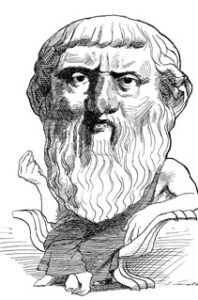Apologia Plato 040

Apología de Sócrates
Actitud de Sócrates ante la muerte
(40c-40e)
Tabla de contenidos
Ἀπολογία Σωκράτους 040
ἐννοήσωμεν δὲ καὶ τῇδε ὡς πολλὴ ἐλπίς ἐστιν ἀγαθὸν αὐτὸ εἶναι. δυοῖν γὰρ θάτερόν ἐστιν τὸ τεθνάναι: ἢ γὰρ οἷον μηδὲν εἶναι μηδὲ αἴσθησιν μηδεμίαν μηδενὸς ἔχειν τὸν τεθνεῶτα, ἢ κατὰ τὰ λεγόμενα μεταβολή τις τυγχάνει οὖσα καὶ μετοίκησις τῇ ψυχῇ τοῦ τόπου τοῦ ἐνθένδε εἰς ἄλλον τόπον.
καὶ εἴτε δὴ μηδεμία αἴσθησίς ἐστιν ἀλλ᾽ [40d] οἷον ὕπνος ἐπειδάν τις καθεύδων μηδ᾽ ὄναρ μηδὲν ὁρᾷ, θαυμάσιον κέρδος ἂν εἴη ὁ θάνατος—ἐγὼ γὰρ ἂν οἶμαι, εἴ τινα ἐκλεξάμενον δέοι ταύτην τὴν νύκτα ἐν ᾗ οὕτω κατέδαρθεν ὥστε μηδὲ ὄναρ ἰδεῖν, καὶ τὰς ἄλλας νύκτας τε καὶ ἡμέρας τὰς τοῦ βίου τοῦ ἑαυτοῦ ἀντιπαραθέντα ταύτῃ τῇ νυκτὶ δέοι σκεψάμενον εἰπεῖν πόσας ἄμεινον καὶ ἥδιον ἡμέρας καὶ νύκτας ταύτης τῆς νυκτὸς βεβίωκεν ἐν τῷ ἑαυτοῦ βίῳ, οἶμαι ἂν μὴ ὅτι ἰδιώτην τινά, ἀλλὰ τὸν μέγαν βασιλέα εὐαριθμήτους [40e] ἂν εὑρεῖν αὐτὸν ταύτας πρὸς τὰς ἄλλας ἡμέρας καὶ νύκτας—εἰ οὖν τοιοῦτον ὁ θάνατός ἐστιν, κέρδος ἔγωγε λέγω: καὶ γὰρ οὐδὲν πλείων ὁ πᾶς χρόνος φαίνεται οὕτω δὴ εἶναι ἢ μία νύξ.
Perge ad initium paginae huius
Apologia Sōcratis 040
Pensemos en firme sobre este punto: que grandes esperanzas hay de que la muerte sea un bien. Porque una de dos cosas es el morir: o bien, un como no ser ya el muerto cosa alguna ni tener sensación alguna de cosa alguna, o bien, como se dice, da la Suerte de que el morir sea para el alma una mudanza y cambio de domicilio de este lugar de aquí a otro.
Y si el morir fuese un no sentir nada —algo así como un sueño tal que durmiéndolo ni tan sólo se viesen ensueños—, [40d] ¡maravillosa ganancia fuera la muerte! Porque tengo para mí que si alguien tuviera que escoger para sí una noche tal que en ella durmiese sin ni aun ver ensueños, y, contraponiendo las otras noches de su vida y sus otros días con esta tal noche, hubiera de decir, bien pensado, qué otro día y qué otras noches mejores y más deliciosas que esta tal noche ha vivido en su vida, tengo para mí que no sólo un particular sino aun el Gran Rey encontraría ser muy [40e] contadas tales noches en relación al número de los días y de las demás noches. Si, pues, tal es la muerte, por mí que la llamo «ganancia»; que, en realidad, según esto el tiempo todo de nuestra vida no parece ser más de una tal noche.
Perge ad initium paginae huius
Apology of Socrates 040
Let us consider in another way also how good reason there is to hope that it is a good thing. For the state of death is one of two things: either it is virtually nothingness, so that the dead has no consciousness of anything, or it is, as people say, a change and migration of the soul from this to another place.
And if it is unconsciousness, [40d] like a sleep in which the sleeper does not even dream, death would be a wonderful gain. For I think if any one were to pick out that night in which he slept a dreamless sleep and, comparing with it the other nights and days of his life, were to say, after due consideration, how many days and nights in his life had passed more pleasantly than that night,—I believe that not only any private person, but even the great King of Persia himself [40e] would find that they were few in comparison with the other days and nights. So if such is the nature of death, I count it a gain; for in that case, all time seems to be no longer than one night.
Perge ad initium paginae huius
Conversaciones en el Ātrium Philosophicum
EN CONSTRVCCION

EN CONSTRVCCION
Perge ad initium paginae huius
OFFICĪNA PHILOSOPHŌRVM ***
